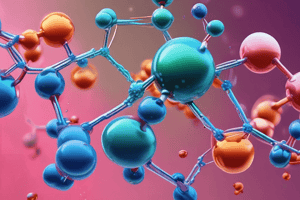Podcast
Questions and Answers
What is the main focus of this article?
What is the main focus of this article?
- Inorganic chemistry (correct)
- Physical chemistry
- Analytical chemistry
- Organic chemistry
Which field of chemistry studies the behavior of matter?
Which field of chemistry studies the behavior of matter?
- Analytical chemistry
- Organic chemistry
- Inorganic chemistry
- Physical chemistry (correct)
What are inorganic materials?
What are inorganic materials?
- Carbon-based substances
- Synthetic metals
- Non-carbon-based substances (correct)
- Naturally occurring elements
What are the unique properties of metals?
What are the unique properties of metals?
Which area does inorganic chemistry cover?
Which area does inorganic chemistry cover?
What is the study of all elements and compounds that are not organic in nature?
What is the study of all elements and compounds that are not organic in nature?
What are alloys?
What are alloys?
Which element is the most abundant in the Earth's crust?
Which element is the most abundant in the Earth's crust?
What is the importance of inorganic chemistry in the construction industry?
What is the importance of inorganic chemistry in the construction industry?
What is the key role of inorganic compounds in various industries?
What is the key role of inorganic compounds in various industries?
What are inorganic compounds?
What are inorganic compounds?
What is the application of inorganic materials in the electronics industry?
What is the application of inorganic materials in the electronics industry?
What does inorganic chemistry study?
What does inorganic chemistry study?
What is the primary function of inorganic compounds in energy production?
What is the primary function of inorganic compounds in energy production?
Flashcards are hidden until you start studying
Study Notes
Chemistry: The Study of Elements and Compounds
Chemistry is the branch of science that studies the properties, structure, and behavior of matter. It is a vast field that encompasses various subdisciplines, including organic chemistry, inorganic chemistry, physical chemistry, and analytical chemistry. In this article, we will focus on inorganic chemistry, which is the study of all elements and compounds that are not organic in nature.
Inorganic Chemistry
Inorganic chemistry is the study of non-carbon-based elements and their compounds. It is a diverse field that covers various areas, such as the synthesis and properties of inorganic materials, the study of metals and their alloys, the behavior of oxygen and other non-metals, and the synthesis and properties of inorganic compounds. Some key aspects of inorganic chemistry include:
-
Inorganic Materials: Inorganic materials are non-carbon-based substances that can be synthesized or naturally occurring. They play a crucial role in various industries, such as construction, electronics, and energy production.
-
Metals and Alloys: Metals are elements that can conduct electricity and heat. They are used in various applications due to their unique properties, such as their ability to conduct electricity and their high strength-to-weight ratio. Alloys are mixtures of two or more metals that are combined to create new materials with improved properties.
-
Oxygen and Other Non-Metals: Oxygen is the most abundant element in the Earth's crust, making up about 47% of the crust by weight. It is a key component of the Earth's atmosphere and plays a crucial role in many chemical and biological processes. Other non-metals include hydrogen, nitrogen, and carbon.
-
Inorganic Compounds: Inorganic compounds are non-carbon-based substances that can be synthesized or naturally occurring. They have a wide range of applications, such as in catalysis, energy storage, and as building blocks for other compounds.
The Importance of Inorganic Chemistry
Inorganic chemistry is essential for various industries and applications. Some of the key applications include:
-
Catalysis: Inorganic compounds are often used as catalysts in chemical reactions, which can speed up the reaction and make it more efficient.
-
Energy Production: Inorganic materials and compounds play a crucial role in energy production, such as in the synthesis of solar cells, batteries, and fuel cells.
-
Construction and Building Materials: Inorganic materials are used in the construction industry for their strength, durability, and other properties, such as in the production of cement and glass.
-
Electronics: Inorganic materials, such as semiconductors, are used in the electronics industry to produce electronic devices, such as transistors and solar cells.
In conclusion, chemistry is a vast field that encompasses various subdisciplines, with inorganic chemistry being one of the most diverse and essential fields. It studies non-carbon-based elements and their compounds, which have a wide range of applications in various industries. Key aspects of inorganic chemistry include the study of inorganic materials, metals and alloys, oxygen and other non-metals, and inorganic compounds. The importance of inorganic chemistry lies in its applications in catalysis, energy production, construction, and electronics.
Studying That Suits You
Use AI to generate personalized quizzes and flashcards to suit your learning preferences.



